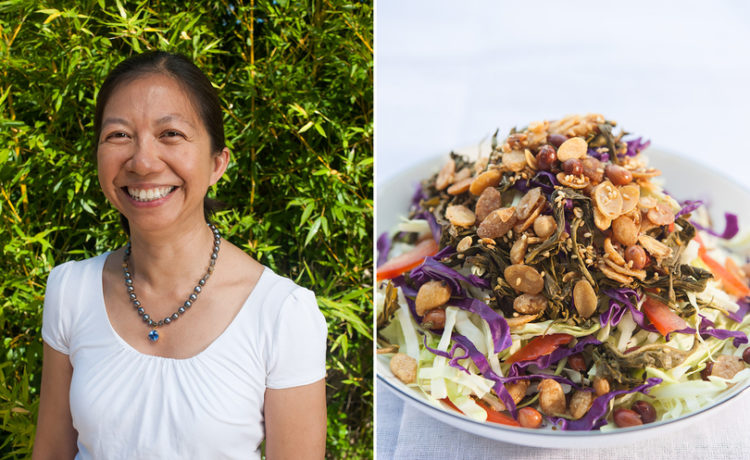
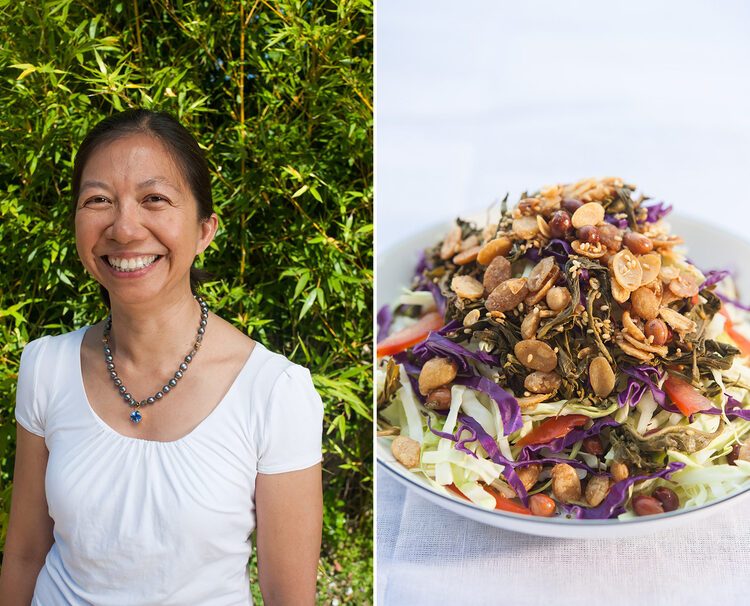
Burmese Lunch for Refugee Aid
After last month’s Vietnamese lunch for The IRC, we head West across the Chinese subcontinent to Burma/Myanmar, also known as The Golden Land for the sheer numbers of golden pagodas around the country. I met April Chou, our next host, two years ago through our common interest in Ashtanga Yoga. A side effect of knowing April is discovering the world of Burmese cuisine. Coming from another Southeast Asian country, I found the salty, sour, bitter and spicy notes comfortingly familiar, even if they were presented differently. My favorite aspect of the Burmese way of eating is how each person is encouraged to make each dish truly their own by using the condiments at their disposal: limes, dried chilies, fresh chilies, peanuts, seeds, etc, to season each dish to one’s taste. This is how one develops an intuition for flavors and how a food culture renews and sustains itself.
Read on for April’s story or head over to Eventbrite to peruse the menu and purchase tickets.
April Chou was born in Mandalay, Burma’s second largest city, a month after the coup d’etat of 1962 ushered in the military junta. The youngest of 10 children, her family lived in the middle of the city, next to Zegyo Market, Mandalay’s most famous and largest market.
She recounts, “I used to go to the market as a child with our cook every morning. At night, the market and 84th Road in front of us turned into the night market so it was just as busy, crowded and colorful as it was in the day. We would either go for an evening stroll or watch the scene from our balcony.”
The absence of TVs or phones in the home meant that the family entertained many friends who dropped by to visit and lingered for a meal. “My mom always ensured that we have enough food for any visitors who might join us for lunch or dinner,” she said. “The Burma that I remember was full of celebrations and festivals and food was always involved. My family is Catholic so we celebrated Christmas with Mohinga (Catfish Chowder) or Ohno Khoi Soy (Coconut Chicken noodle soup) every year. Most of my friends are Buddhists so I attended many religious ceremonies. My childhood friend Marlar is Muslim so I used to go to her house for Eid and Ramadan.”
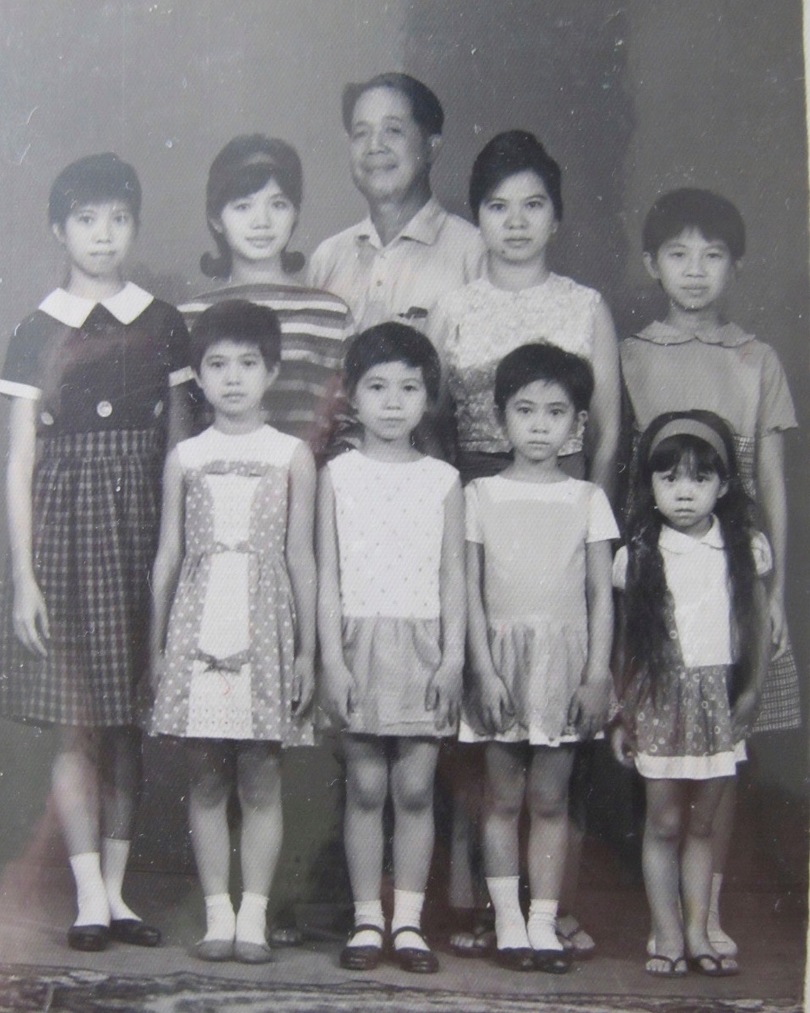
April (first row, first from the right) with her parents and some siblings, around 1968-69. Her three eldest siblings were already in the US at the time this portrait was made.
The youngest of 10 children, she arrived in the US at the age of 15 along with two of her sisters. All of them were sponsored by her eldest sister Peggy, a doctor in Chicago. At that time, just travelling to another town within Burma required government approval so a trip to America was a big deal. Though excited about taking a plane for the first time and travelling halfway across the globe, she left unsure if she would see her parents or her childhood friends again (her parents eventually moved to the US in 1984), or if she would ever return to Burma.
“In 1962, the junta took over all private enterprises when they came into power, including my father’s bar and liquor import business,” she reflected. “To make ends meet, my mother worked as a tailor and my parents had to sell their jewelry (my father was born in Mogok, a town renowned for its rubies and sapphires). Food was often rationed so we had to get creative with our cooking. Our education was constantly disrupted because of school closures and student uprisings.”
The sisters first landed in Honolulu, where one of her older siblings worked as a Pathologist. The island’s tropical climate and laid back vibe was too similar to their home country that it contradicted the impressions they formed from pictures and letters of an America that was covered in snow with a skyline of tall skyscrapers. They eventually settled in Chicago, joining Peggy and her husband and their older siblings. For April, the early years were a challenging adjustment to American life and mastering English was not easy. She spent her high school years working 15-20 hours/week at different jobs after school, motivated by a desire for financial independence.
“When I arrived here, I was told, if you work hard, you will succeed,” she shared. “My first job was flipping hamburgers at Burger King. I then worked as a sales clerk at a dime store called Woolworth’s on Michigan Avenue, and after that, spent many years working at Marshall Field’s, the largest department store at the Water Tower. I saved hard and was able to afford a trip to Spain with my high-school classmates in junior year.”
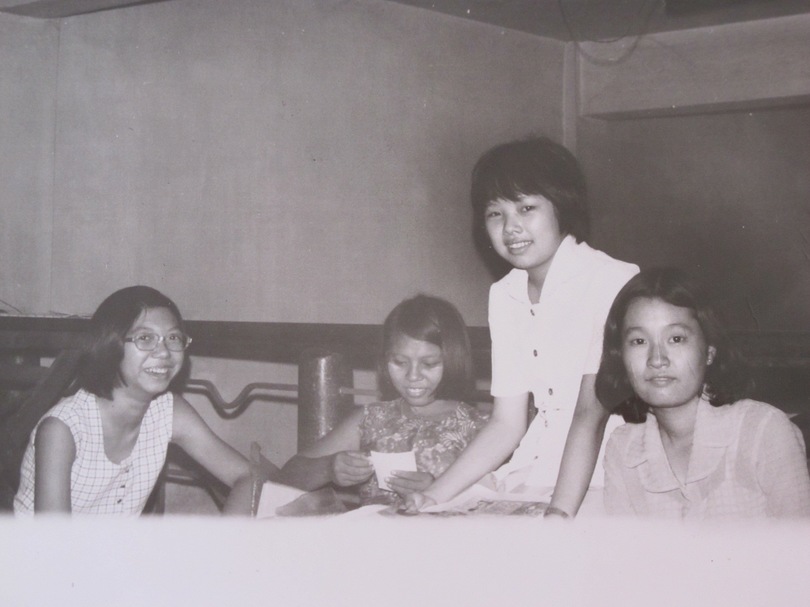
April (first from left) in 1977 with her best friends just before leaving for the US .
April obtained her degree in Computer Engineering from the University of Illinois (Urbana-Champaign) and moved to the Bay Area in 1995 to work for Cisco Systems. After a long career in tech, she now pursues her interests in Ashtanga yoga, Vipassana meditation and plant-based food and nutrition. She’s received certificates from Cornell University’s Plant-Based Nutrition program and an Ayurvedic food and nutrition program from Mysore, India. In 2016, she enrolled in Bauman College’s Natural Chef training program that included an internship at The Ravens, a prominent vegan restaurant in Mendocino. These food-centric pursuits echo the role that food has played in her life and the communal family gatherings of her childhood. This Tapestry Suppers meal features one of her family’s recipes, “I am making Kyauk Kyaw (Coconut Agar Jelly) for dessert. My mother used to make this for community gatherings in the ’70s but over time it’s disappeared from our family meals as more American and French desserts took their place,” said April.
The proceeds from this lunch will benefit the Catholic Charities of Fort Wayne-South Bend, an organization in Indiana that works to support and resettle newly-arrived refugees and asylees in the US. Fort Wayne, IN is home to the largest Burmese community in America (estimated at over 6,000), most of them refugees fleeing ethnic and civil war in Burma. Check out their site for more information about what they do and the services they provide.
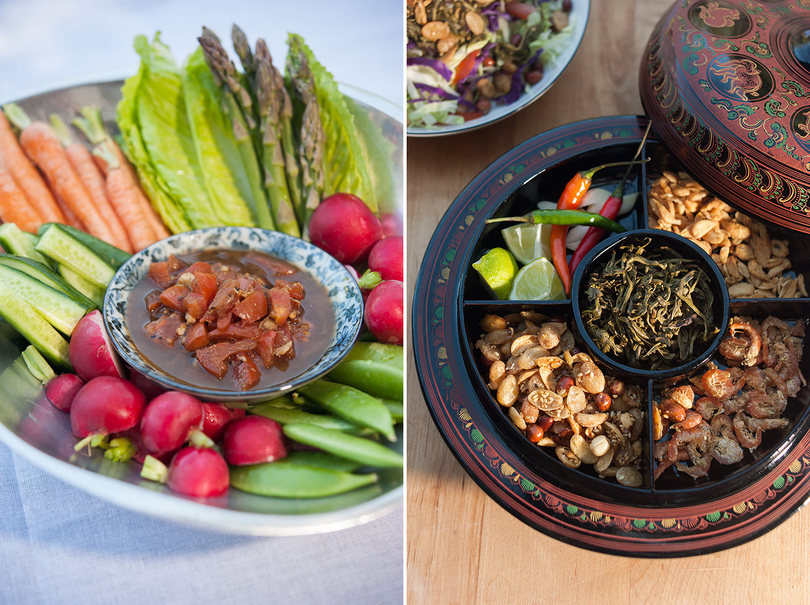
Next steps to consider…
- To attend April’s Burmese lunch on Sunday the 23rd, head over to Eventbrite to purchase tickets and register.
- Sign up for our newsletter to be the first to know about upcoming events.
- Send me an email if you’d like to host and/or cook a meal, or if you know of someone who would be a good fit.
- Sign up for our newsletter to be the first to know about upcoming events.
- Follow us on Instagram.
- Donate: this is very much a labor of love so any support for operating expenses are always welcome.

